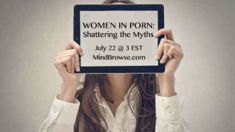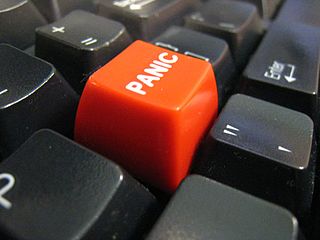It’s difficult to pin down and deal with all of the anti-porn arguments flying around. They seem to mutate constantly, and often contradict each other. For those of us who regularly encounter anti-porn activists, it’s hard to explain to others the sheer lack of intelligence in the anti-porn movement. Just as in the climate-change “debate”, there isn’t really much of a debate at all – just facts clashing with dogma to create noise.
So I’m indebted to the anti-porn campaigner (well, anti-porn entrepreneur is probably more accurate) known as One Angry Girl, who seems to be a minor celebrity in the puritanical feminist community, and even has a testimonial on her site from a member of our favourite UK anti-sex group, Object.
OAG has kindly pulled together 17 “pro-porn” statements, and her rebuttals, into one handy crib-sheet. And since I was in the mood for a blogging marathon, here are all 17, with my own comments. Her points are made using a “They say”/”You say” formula, and feature a high venom/fact ratio.
OAG is very, very angry that some women take off their clothes for money. She’s so livid, she’s determined to stop them from doing so. Because that will make her feel better, for some reason which she never explains. So here it is: proof that porn is evil.
1) They say: But they’re enjoying themselves
You say: If they enjoy it so much, then they would be willing to do it for $7.50 per hour.
I say: How do you know they wouldn’t? Some do it for free – check out all the amateur porn that people upload themselves.
Or: Women in porn are often screaming with joy, but sometimes they are also screaming in pain. Which should we believe? If their pleasure is real, and not faked, then their pain is also real, and not faked.
I say: Have you tried asking the women how they feel during a scene? No? Why not? Shouldn’t you learn something about how this art-form actually works behind the scenes, before dedicating your life to hating it?
Or: Once Jenna Jameson got very powerful in the industry, she began refusing do scenes involving anal sex. This suggests to me that she doesn’t actually enjoy anal sex. Yet Im sure if you investigate her earlier movies, you can probably find a scene or two where she is appearing to enjoy it. Why? Its called acting.
I say: Some pornstars I’ve met choose not to have anal sex on camera; some choose to do it. Agencies will ask girls up-front what their “levels” are: anal, boy-girl, girl-girl, solo, etc. The girl gets to choose. The key thing isn’t whether anal sex hurts, or if you find it icky: it is the C-word: Consent. For somebody who sells anti-rape bumper stickers on your site, you don’t seem to care much about consent.
2) They say: Strippers are empowered
You say: If they’re so powerful, then why do strip clubs have security guards protecting the dancers? Why do women working bachelor parties have to take security with them?
I say: Erm… in my experience, they don’t.
Or: How is it empowering for women to give men exactly what they’ve come to expect from us?
I say: I find it empowering when I make a woman cum. Likewise, I know many women find it empowering to give a man a hard-on.
Or: How is it empowering to grovel and compete for male attention and cash…like a trained seal doing flips in a tank to get his fish reward?
I say: You could ask strippers that question. But since you don’t actually care what they think, you won’t. Your comment about being a “trained seal” simply reveals your disdain for the stripper. So be clear: are you trying to rescue them, or do you merely hate them?
3) Porn/prostitution have always been around, they always will be, so what’re you gonna do?
You say: Rape, murder, and incest have always been around too. Should we be okay with those things?
I say: Porn and prostitution involve consent. Rape, murder, incest do not. Consent good, coercion bad. Got it yet?
4) They say: Porn-stars and strippers are celebrating their sexuality
You say: Why does celebrating your sexuality always seem to happen in public for strangers and a paycheck? Does anyone ever get to celebrate their sexuality in private with their partner?
I say: Yes, pornstars (and most of the rest of us) also fuck in private. Many of them are in relationships, and many are married. They’re real people with minds, feelings, and lives beyond the porn set. And they also choose to earn money fucking on camera. And you choose to obsess about it.
5) They say: My partner and I both enjoy using porn, so what’s the problem? Who’s getting hurt?
You say: Some people like to wear fur coats, or eat veal, or shop at Wal-Mart. Your enjoyment of a product does not erase the suffering that went into creating that product.
I say: I’m pretty sure animals don’t surrender their fur or their meat consensually. When pornstars are skinned to make coats or killed for their meat, I’ll join your anti-porn crusade.
6) They say: Ok, maybe some of the women in porn didn’t freely choose their careers, but lots of them did.
You say: If you have a comprehensive research survey of all current and former porn workers, I’d love to see it. There isn’t one available. However, there are major studies involving prostitutes around the world, which found that 90% of them wanted out immediately, but didn’t have the resources.
I say: There’s plenty of research into porn – but you’re clearly not interested in seeing it. For example here’s a study covering 10,000 pornstars, which is around 10,000 more than you’ve researched. But then, facts and prejudice don’t sit well together.
7) They say: Ok, well not everyone who uses porn becomes a rapist/addicted/fucked-up
You say: Not everyone who smokes cigarettes gets lung cancer, and cigarettes still come with warning labels.
I say: Porn use correlates with declining rates of sexual violence. So if porn is creating rapists, why do the statistics not show this?
8) They say: If you hate porn, just don’t watch it
You say: That’s like saying if you hate air pollution, dont breathe. I’m surrounded by porn everywhere I go whether I like it or not. Where’s my free choice not to see it?
I say: If you think you’re surrounded by porn everywhere you go, you might be confusing “porn” with “everything”. You are clearly unusually sensitive to displays of sexuality. Perhaps – as this article in Psychology Today suggests, porn isn’t the problem: You are!
9) They say: Nobody is forcing them to do it. It’s their choice.
You say: The word “choice” implies that there was at least one other viable option available. What was their other option?
I say: They could do a job that doesn’t involve getting naked, but for less money, like the rest of us do. Or are you implying that pornstars are too dumb to do anything else? Who forced you to design and sell shouty T-shirts? It surely wasn’t your choice. Let me rescue you!
10) They say: Pornography and prostitution are different.
You say: Not really, pornography is just prostitution plus a camera.
I say: No, doing porn isn’t exactly the same as prostitution, but for sure they both involve money and sex. And since you don’t seem to be anti-money, you’re quite clearly anti-sex.
11) They say: Porn has always existed. Look at Pompeii.
You say: Three wall paintings in Pompeii do not compare to the multi-billion dollar global industry we have today. That’s like comparing a caveman’s smoke signals to the iPhone.
I say: Pompeii didn’t just have a few wall paintings: it had many explicit statues on public display like the one recently shown in the British Museum of Pan having sex with a goat. Quite possibly, your Roman ancestors were selling angry T-shirts (in Latin).
12) They say: You just hate sex.
You say: Porn is not sex, but a distorted, for-sale, fictionalized version of sex. If I told you I don’t eat at Burger King, would you tell me I hated food?
I say: No, but if you became upset by pictures of flame-grilled Whoppers, I might think you’re crazy.
Or: I like sex just fine. But I prefer to have sex only with someone I actually know and like, for free, in private with no strangers watching. Why is that weird to you?
I say: It’s not weird to have sex in private. Most people (including pornstars) do that. Nobody is telling you how to conduct your sex life. Why are you so determined to tell other people how to lead their sex lives? Perhaps you’d make a good dominatrix.
13) They say: You’re just jealous because you’re not as pretty as a porn-star
You say: Even porn-stars don’t look like their original selves. After a few rounds of surgery, a dye job, and some makeup I could look exactly like them.
I say: You clearly haven’t looked at much porn. Porn is far more accepting of non-standard ideas of beauty than most other forms of performance. I’ve met pornstars from 18 to 70, and every shape, size and race. You too could be a pornstar, without the need for surgery or a dye job (and don’t worry, makeup will be provided for you on-set). Of course, the only person who can decide whether you should be a pornstar is you.
14) They say: You’re just jealous because men like them better than you.
You say: It’s been successfully proven that just about any naked woman can get any straight man’s attention pretty quickly. It’s not hard to do, and it doesn’t make you special.
I say: Meeeeee-OW!
15) They say: I’ve watched porn and I’ve never raped anyone.
You say: I guess you are arguing that words and images paired together do not have the power to influence human behavior. If that is your argument, then kindly explain:
[1] the multi-billion dollar industry called ‘advertising’
[2] kids learning their ABCs from Sesame Street
[3] people learning to make a meal by watching Martha Stewart
[4] public service announcements telling us not to drink and drive
[5] (insert your own example here)
I say: And horror films make people murder each other with chainsaws, and Grand Theft Auto makes people run over old ladies for fun. Except they don’t. Because the human mind is a little more complex than you think.
16) They say: The women in the industry make more money than men, therefore it’s empowering to them.
You say: It’s true that pornography and prostitution are the only industries where a woman can out-earn her male counterparts. What does that say about our economy, or about women’s power, that the only way for a woman to outearn a man is to get naked and fuck strangers?
I say: So when male bankers earn more than women, women are oppressed? But when female pornstars out-earn male ones, that also means women are oppressed? In fact, you (finally) raise an interesting question. And there are interesting answers. But why aren’t you campaigning for women to earn more in banking rather than attacking the one trade where women do earn more?
17) They say: You want to censor all porn!
You say: I haven’t ever mentioned censorship, which doesn’t address demand for porn. You’re saying that to shut me up and it won’t work.
I say: It’s true, you haven’t mentioned censorship, though most anti-porn campaigners are pro-censorship. In fact, you haven’t mentioned any solution to these “problems” at all. Funny that… perhaps you don’t actually give a damn, and you just want to sell more angry T-shirts? According to your site, you’ve sold 24,000 of them. Yay capitalism!





